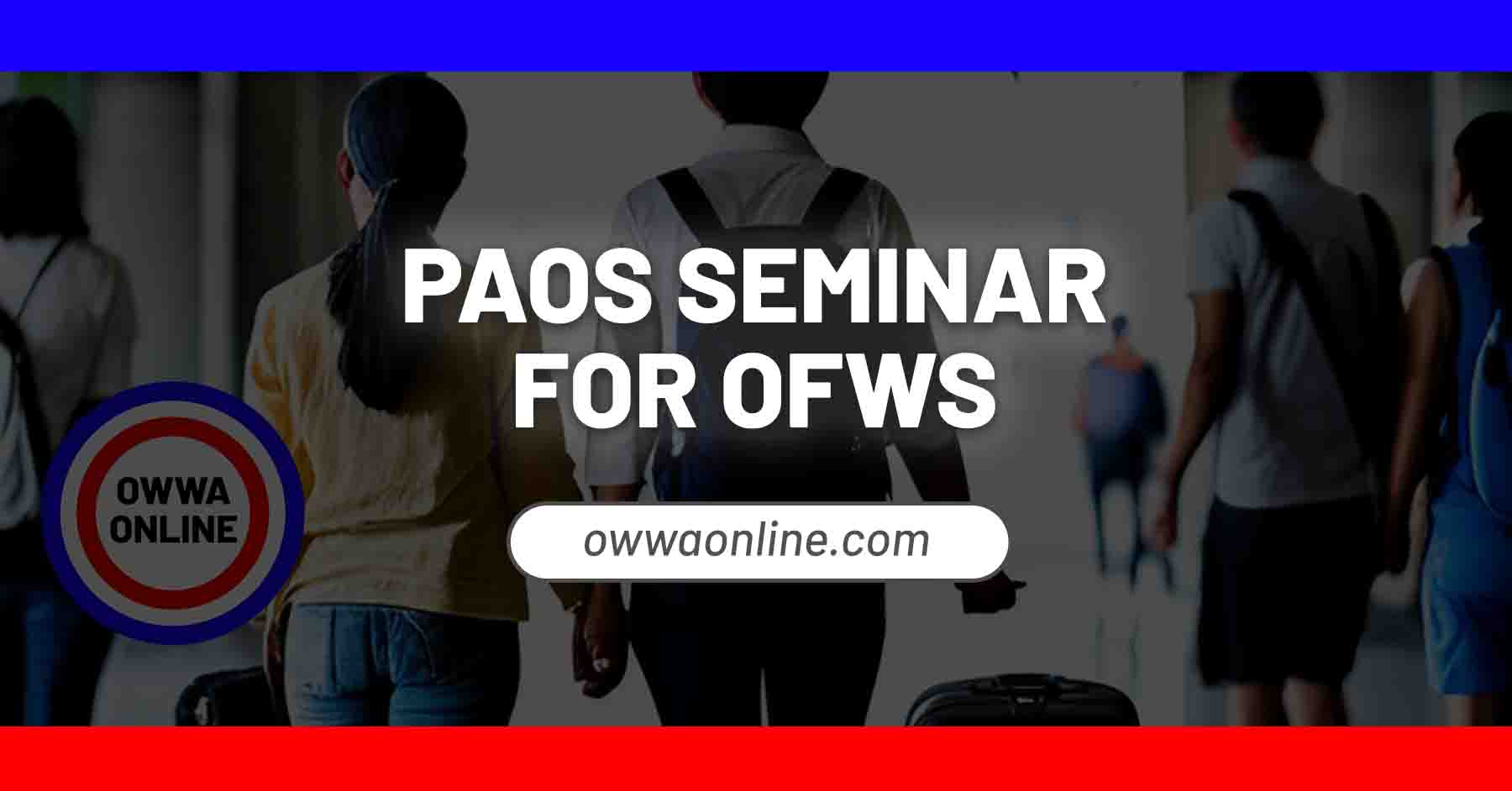The PAOS or Post-Arrival Orientation Seminar is designed for Overseas Filipino Workers by the Department of Migrant Workers. This orientation seminar is conducted for OFWs who recently landed in their host country. DMW is working with the Department of Labor and Employment and the International Labor Affairs Bureau to create an online version for specific countries where Filipino migrant workers are based. These initiatives are meant to ease the burdens of OFWs and make sure they will have a smooth experience transitioning to a new workplace.
The online PAOS will be another platform that will help in implementing the program on-site. The main purpose of this program is to bring awareness to all OFWs in terms of their responsibilities and rights while providing them with essential information as they complete their overseas contract. Basically, the seminar will tackle cultural orientation, legal assistance, financial management, health and safety, labor rights, and other important topics.

What is PAOS for OFWs?
The Post-Arrival Orientation Seminar for OFWs aims to assist in the secure transition after arriving in the host country for employment. The orientation program is conducted by recruitment agencies accredited by the Philippine Overseas Employment Administration or by DMW representatives. The seminar includes discussions, group activities, interactive exercises, and lectures to help OFWs adjust to the working and living environment abroad.
PAOS is the counterpart for the Pre-Departure Orientation Seminar or PDOS. Under this program, OFWs undergo a seminar upon their arrival at their job site. This is to educate them about the obligations and living conditions they can expect from working abroad. The lectures include services and programs currently offered by the government in the host country.
Requirements
Before OFWs can attend the orientation seminar in their host country, they must consider the documentary requirements they must prepare. Here are the documents that you should secure when attending PAOS:
- Copy of a valid Philippine passport
- Valid IDs such as OFW ID or any government-issued ID
- Additional documents that may be required
The Department of Labor and Employment has advised a specific content format according to Administrative Order No. 532 so that the structure will include necessary information regarding the customs, culture, and traditions of the host country where OFWs will be working. The content structure for PAOS contains these qualities that Filipino migrant workers must be familiar with:
- All programs and services offered by the Philippine government to OFWs.
- Customs and traditions of the host country and workplace.
- Ways to adjust to the new work environment.
- Rights of the employees as well as their obligations must be fulfilled.
- Regulatory framework that governs immigration and labor, emergency services, employment contracts, social support services, training programs, Filipino community projects, and health and safety.
Moreover, the POEA is mandated through the Administrative Order to advocate for global employers and recruitment organizations to allow OFWs including domestic workers to show up in the orientation seminar.
Employers should also present their passports and valid IDs to OFWs in order to confirm their identity. To review their contracts, OFWs must verify all important information including their days off or rest hours, agreed monthly salary, employer’s phone number, address, and family members. The OFW and employer can then sign the contract once they’ve made sure everything is accurate.
Benefits
There are so many reasons OFWs should never skip PAOS once they arrive at the country of their employment. The Philippine government aims to ensure that all Filipino migrant workers are given support to succeed in their endeavors. Through PAOS, OFWs can learn the following:
- Strategies for adjusting to a new workplace and fitting into the job role.
- Rights, obligations, and legal options when it comes to exercising OFW rights against being violated in a foreign land.
- Philippine government services and programs are intended for all Filipino migrant workers around the world.
- Information about the new workplace’s culture, traditions, practices, and other relevant activities.
In order to get all these benefits and successfully implement the objectives of PAOS, some guidelines must be in place. For instance, the OFW, employer, and a Foreign Recruitment Agency representative or someone from the Philippine Embassy or MWO must be there during the orientation seminar. The OFW and his employer must have met already before making any agreements.
Once the OFW, employer, and one representative from the Philippine Embassy, MWO, or FRA are in attendance, PAOS may take place in the MWO office or at the airport for more convenience for the OFWs. Some topics that are covered in the seminar include:
- OWWA Services
- Pag-IBIG Services
- Labor Laws & Rules
- Financial Literacy
- Balik-Manggagawa
- SSS Services
- Host Country and Culture Overview
Video: Ito Na Ba Ang Sagot Sa Problema Ng Mga OFW? PAOS Post Arrival Orientation Seminar
In this video, you will learn everything about the Post-Arrival Orientation Seminar for Overseas Filipino Workers who have just arrived in their host countries for employment. It includes information on the process, requirements, and other helpful tips to navigate the process in the most convenient way possible. Watch until the end to get insights on how you can benefit from this program.
Summary
All Overseas Filipino Workers across the globe are required to attend the Post-Arrival Orientation Seminar according to POEA and DOLE. Therefore, it’s important to get familiar with the program and the process of how to qualify and submit the required documents. It aims to educate OFWs arriving at their host country regarding the new culture, economy, legal system, lifestyle, and working and living conditions.
Post-arrival orientation seminars are implemented within one month after the OFW has arrived in their host country to work. This is to guide them when it comes to the expectations and obligations they should have in their new workplace. It’s important to familiarize yourself with this information to ensure you will have a hassle-free transition as well as adjustment to your new employer and job site.